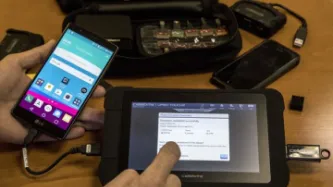Search
Content type: Examples
In November 2017, San Francisco-based Strava, maker of a GPS-enabled fitness app, published a heat map showing the activity of all its 27 million users around the world. Upon outside examination, the data visualisation, which was built from 1 billion activities and 3 trillion data points covering 27 billion kilometres of distance travelled over the previous two years, exposed individual jogging routes in remote areas, including those used by soldiers around military bases in war zones, where…
Content type: Examples
EU antitrust regulators are studying how companies gather and use big data with a view to understanding how access to data may close off the market to smaller, newer competitors. Among the companies being scrutinised are the obvious technology companies, such as Google and Facebook, and less obvious companies such as German car maker BMW. The commissioner for competition, Margrethe Vestager, says her office has not yet found cause for concerns, although it fined Facebook for giving misleading…
Content type: Examples
In 2016, the US Federal Trade Coimmission issued a warning to app developers that had installed Silverpush, software that uses device microphones to listen for audio signals inaudible to the human ear that identify the television programmes they are watching. Nonetheless, similar technology continued to spread. In 2017, software from the TV data collection startup Alphonso, began to spread. As many as 1,000 gaming, messaging, and social apps using Alphonso's software, some of them aimed at…
Content type: Examples
A report for the US National Academy of Sciences explains the methods used by a team of computer scientists to derive accurate, neighbourhood-level estimates of the racial, economic, and political characteristics of 200 US cities using the images collected by Google Street View in 2013 and 2014. The key element: the pictures captured of 22 million cars parked along or driving down those streets. The scientists trained a computer algorithm to recognise the make, model, and year of each…
Content type: Examples
Sidewalk Labs, a subsidiary of Alphabet (Google's owner), has signed a deal with the Canadian city of Toronto to redevelop the brownfield Quayside waterfront district and turn it into a technology hub. The deal raises three sets of issues. First (The Guardian) is the essential privatisation of public space by granting Sidewalk Labs over the technology used and the data collected. Second (The Civicist), are the privacy implications, discussed in a public forum, of allowing Sidewalk Labs to…
Content type: Examples
A recent study from the Yale Privacy lab and Exodus Privacy founds dozens of invasive trackers hidden in common Android apps. However, the method the researchers used, which involved writing code to expose the internal workings of the devices they tested, is legally barred under the US Digital Millennium Copyright Act (2000). Apple's iOS operating system is locked with digital rights management (DRM) software, and both the DMCA and the EU's Copyright Directive prohibit circumventing DRM or…
Content type: Examples
Some of the Google Home Mini units distributed before release to the tech press and at "Made By Google" events had a defective touch panel. The devices were meant to turn on recording only when the owner woke it up with "OK, Google" or applied a long press to the centre of the touch panels. Instead, the defect meant that the devices turned on recording thousands of times a day and attempted to respond to random noises rather than waiting for the "OK, Google" prompt or long press. The problem…
Content type: Examples
Cracked Labs examines the impact on individuals, groups, and wider society of the corporate use of personal information as it feeds into automated decision-making, personalisation, and data-driven manipulation. On the web, companies track us via hidden software that collects information about the sites we use, our navigation patterns, and even our keystrokes, mouse movements, and scrolling activity and transmits it to hundreds of third-party companies. Similarly, smartphones send a flow of…
Content type: Examples
A report from the University of Washington studies parents' and children's interactions with general-purpose connected devices and connected toys. There are numerous privacy issues: toy companies may collect masses of children's intimate data; the toys may enable parents to spy on their children, and criminals hacking these systems may be able to identify and locate the children. For example, the 2015 cyber attack on VTech, a children's tablet maker, exposed the personal data of 5 million…
Content type: Examples
In 2013, Harvard professor Latanya Sweeney found that racial discrimination pervades online advertising delivery. In a study, she found that searches on black-identifying names such as Revon, Lakisha, and Darnell are 25% more likely to be served with an ad from Instant Checkmate offering a background check to find out whether the person has been arrested. The exact cause is difficult to pinpoint without greater insight into the inner workings of Google AdSense than the company is willing to…
Content type: Examples
In 2015, security contractors at Kryptowire discovered that some cheap Android phones came with pre-installed software that monitors where users go, whom they communicate with and the contents of the text messages they write. Written by the China-based company Shanghai Adups Technology Company, the software transmitted call logs, contact lists, location information, and other data to a Chinese server. Its presence was not notified to users. The company explained that the software was not…
Content type: Explainer
“Smart city” is a marketing term used to define the use of technology – and in particular data collection – to improve the functioning of cities. The idea behind smart cities is that the more local governments know about city inhabitants the better the services they deliver will be. However, the reality is that the term means different things to different actors from companies to governments.
The World Bank suggests two possible definitions of smart cities. The first one is “a technology-…
Content type: Examples
The price of using voice search is that Google records many of the conversations that take place in their presence. Users wishing to understand what Google has captured can do so by accessing the portal the company introduced in 2015. Their personal history pages on the site include both a page showing activity on the web and a separate specific audio page that lists the captured recordings. The information made available there includes when and how by what device or app the sound was recorded…
Content type: Examples
As speech recognition and language-processing software continue to improve, the potential exists for digital personal assistants - Apple's Siri, Amazon's Alexa, and Google Assistant - to amass deeper profiles of customers than has ever been possible before. A new level of competition arrived in 2016, when Google launched its Home wireless speaker into a market that already included the Amazon Echo, launched in 2014. It remained unclear how much people would use these assistants and how these…
Content type: Examples
In 2016, Facebook and Google began introducing ways to measure the effectiveness of online ads by linking them to offline sales and in-store visits. Facebook's measurement tools are intended to allow stores to see how many people visit in person after seeing a Facebook campaign, and the company offered real-time updates and ad optimisation. Facebook noted that information will only be collected from people who have turned on location services on their phones. The company also offered an Offline…
Content type: Examples
By 2016, numerous examples had surfaced of bias in facial recognition systems that meant they failed to recognise non-white faces, labelled non-white people as "gorillas", "animals", or "apes" (Google, Flickr), told Asian users their eyes were closed when taking photographs (Nikon), or tracked white faces but couldn't see black ones (HP). The consequences are endemic unfairness and a system that demoralises those who don't fit the "standard". Some possible remedies include ensuring diversity in…
Content type: Examples
In 2015, ABI Research discovered that the power light on the front of Alphabet's Nest Cam was deceptive: even when users had used the associated app to power down the camera and the power light went off, the device continued to monitor its surroundings, noting sound, movement, and other activities. The proof lay in the fact that the device's power drain diminished by an amount consistent with only turning off the LED light. Alphabet explained the reason was that the camera had to be ready to be…
Content type: Examples
In the 2014 report "Networked Employment Discrimination", the Future of Work Project studied data-driven hiring systems, which often rely on data prospective employees have no idea may be used, such as the results of Google searches, and other stray personal data scattered online. In addition, digital recruiting systems that only accept online input exclude those who do not have internet access at home and must rely on libraries and other places with limited access and hours to fill in and…
Content type: Examples
In 2012, London Royal Free, Barnet, and Chase Farm hospitals agreed to provide Google's DeepMind subsidiary with access to an estimated 1.6 million NHS patient records, including full names and medical histories. The company claimed the information, which would remain encrypted so that employees could not identify individual patients, would be used to develop a system for flagging patients at risk of acute kidney injuries, a major reason why people need emergency care. Privacy campaigners…
Content type: Examples
In April 2016, Google's Nest subsidiary announced it would drop support for Revolv, a rival smart home start-up the company bought in 2014. After that, the company said, the thermostats would cease functioning entirely because they relied on connecting to a central server and had no local-only mode. The decision elicited angry online responses from Revolv owners, who criticised the company for arbitrarily turning off devices that they had purchased. The story also raised wider concerns about…
Content type: Impact Case Study
What is the problem
Business models of lots of companies is based on data exploitation. Big Tech companies such Google, Amazon, Facebook; data brokers; online services; apps and many others collect, use and share huge amounts of data about us, frequently without our explicit consent of knowledge. Using implicit attributes of low-cost devices, their ‘free’ services or apps and other sources, they create unmatched tracking and targeting capabilities which are being used against us.
Why it is…
Content type: News & Analysis
This op-ed originally appeared in the Huffington Post.
As technologies used by the police race ahead of outdated legislation, we are left vulnerable to potential for misuse and abuse of our data
The vast quantities of data we generate every minute of the day and how it can be exploited is challenging democratic and societal norms. The use by UK police forces of technologies that provide access to data on our phones, which document everything we do, everywhere we go, everyone we interact with…
Content type: Long Read
In December 2017, Privacy International published an investigation into the use of data and microtargeting during the 2017 Kenyan elections. Cambridge Analytica was one of the companies that featured as part of our investigation.
Due to the recent reporting on Cambridge Analytica and Facebook, we have seen renewed interest in this issue and our investigation. Recently in March of 2018, Channel 4 News featured a report on micro targeting during the 2017 Kenyan Presidential Elections, and the…
Content type: News & Analysis
Written by the Foundation for Media Alternatives
7:01: Naomi wakes up and gets ready for the day.
7:58: Naomi books an Uber ride to Bonifacio Global City (BGC), where she has a meeting. She pays with her credit card. While Naomi is waiting for her Uber, she googles restaurant options for her dinner meeting in Ortigas.
9:00: While her Uber ride is stuck in traffic on EDSA (a limited access highway circling Manilla), Naomi’s phone automatically connects to the free WiFi offered by the…
Content type: Legal Case Files
Investigatory Powers Tribunal
Case No. IPT/13/92/CH
Status: On Appeal
In July 2013, Privacy International filed a complaint before the Investigatory Powers Tribunal (IPT), challenging two aspects of the United Kingdom's surveillance regime revealed by the Snowden disclosures: (1) UK bulk interception of internet traffic transiting undersea fibre optic cables landing in the UK and (2) UK access to the information gathered by the US through its various bulk surveillance programs. Our complaint…
Content type: News & Analysis
Simply put, the National Security Agency is an intelligence agency. Its purpose is to monitor the world's communications, which it traditionally collected by using spy satellites, taps on cables, and placing listening stations around the world.
In 2008, by making changes to U.S. law, the U.S. Congress enabled the NSA to make U.S. industry complicit in its mission. No longer would the NSA have to rely only on international gathering points. It can now go to domestic companies who hold massive…
Content type: News & Analysis
7 October 2013
The following is an English version of an article in the September issue of Cuestión de Derechos, written by Privacy International's Head of International Advocacy, Carly Nyst.
To read the whole article (in Spanish), please go here.
The Chinese government installs software that monitors and censors certain anti-government websites. Journalists and human rights defenders from Bahrain to Morocco have their phones tapped and their emails read by security services. Facebook…
Content type: News & Analysis
This post was written by Chair Emeritus of PI’s Board of Trustees, Anna Fielder.
The UK Data Protection Bill is currently making its way through the genteel debates of the House of Lords. We at Privacy International welcome its stated intent to provide a holistic regime for the protection of personal information and to set the “gold standard on data protection”. To make that promise a reality, one of the commitments in this government’s ‘statement of intent’ was to enhance…
Content type: Long Read
The battle for Kenyan voters’ allegiance in the 2017 Presidential election was fought on social media and the blogosphere. Paid advertisements for two mysterious, anonymous sites in particular started to dominate Google searches for dozens of election-related terms in the months leading up to the vote. All linked back to either “The Real Raila”, a virulent attack campaign against presidential hopeful Raila Odinga, or Uhuru for Us, a site showcasing President Uhuru Kenyatta’s accomplishments. As…




























